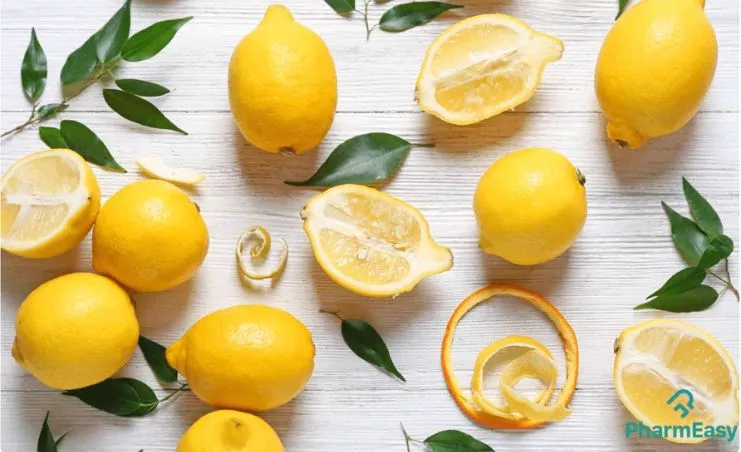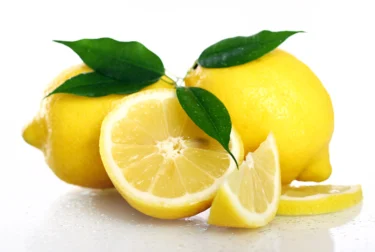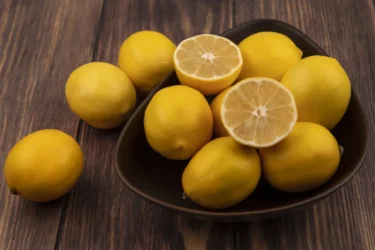Lemon (Nimbu): Uses, Benefits, Side effects By Dr. Smita Barode
By Dr Smita Barode +2 more

Get,

to manage your symptom
Get your,


4 Cr+ families
benefitted

OTP sent to 9988776655



You’ve successfully subscribed to receive
doctor-approved tips on
Whatsapp

Get ready to feel your best.

Hi There,
Download the PharmEasy App now!!


Register to Avail the Offer
Send OTPBy continuing, you agree with our Privacy Policy and Terms and Conditions

Hi There,
Sign up on PharmEasy now!!
Trusted by 4 crore+ families

OTP sent to 9988776655



You have unlocked 25% off on medicines




Code: NU25
By Dr Smita Barode +2 more
Table of Contents
“When life gives you lemons, make lemonade” is a famous proverbial phrase that tells us to look at the bright side and keep moving forward in life. Just like the saying, lemons or Citrus limon are bright yellow, oval-shaped edible fruits with a pronounced bulge on one end. Lemons are available in different sizes, with the raw ones being green in colour and the ripe ones turning a beautiful bright yellow. Lemons are native to the Himalayan foothills of Thailand, Indonesia, the Philippines and North India. In India, they are the third largest crop after bananas and mangoes and thus, they have become an economically important crop.
This flavoured fruit has a juicy yellow flesh that is sour in taste. Their tartness and citric fragrance make them a kitchen favourite. James Lind, the pioneer of clinical research, carried out the very first clinical trial in history with lemons as his focus. The findings of this trial supported the use of lemons for treating scurvy. Let’s find out more about this lovely fruit1,2!

Lemons are packed with the goodness of minerals and vitamins, especially Vitamin C and polyphenols like polymethoxyflavones. The nutritional components of lemons are mentioned in the table below.
Scientifically proven properties of C.limon include:
Some of the potential benefits of lemons are described below.

Plant constituents like polyphenols may help manage obesity. Fukuchi et al. conducted a study6 in 2008 to assess the effect of lemon polyphenols on obesity in white mice. Polyphenols in lemons might be responsible for suppressing fat accumulation and weight gain in the body. This indicates that the consumption of lemon may help in managing obesity. However, scientific evidence supporting this claim is limited, and this warrants the need for conducting further research.

Cancer is the leading cause of death, and literature reviews have shown a clear positive relationship between dietary polyphenols (which are strong antioxidants) and cancer. Al-Ataby conducted a study7 in 2022 to assess the effect of lemon and ginger administration on breast cancer tumour growth in mouse models. The findings of this study11 support that 50% of mice consuming the lemon-ginger combination did not develop tumours due to the presence of alpha-pinene and alpha-terpineol. This indicates that the consumption of lemon may show anti-cancer properties. However, we need more studies to support these claims.

Along with antihypertensive medications, herbs and CAM (complementary and alternative medicines) have increased to manage hypertension. A literature review conducted by Zuhal et al. in 2012 suggests8 that lemon juice may help reduce systolic blood pressure. Tezel et al. conducted a study in 2003 in turkey to assess the therapeutic potential of lemon juice on blood pressure maintenance. The findings of this study support the use of lemon juice as an alternative therapy for decreasing blood pressure. This indicates that consuming lemon juice may help manage blood pressure. However, scientific evidence supporting these claims is limited, and this warrants the need for more clinical studies to support these claims.

Asthma is a chronic inflammatory disorder of the airways known to impair normal breathing. The use of natural products as a complementary or alternative treatment for asthma has increased. For almost 5000 years, the use of plant-based products as traditional medicine for the treatment of asthma has been reported. Costa et al. conducted a study9 in 2010 to identify plant-based natural products for managing asthma. This study identified lemon as a potent anti-asthmatic agent. Additionally, lemons may help reduce cough (anti-tussive property). This indicates that lemons may have the potential to manage asthma and may provide symptomatic relief, but we need more scientific evidence to support these claims3.

Scurvy is a disease caused by a deficiency of Vitamin C and is characterised by generalised weakness, bleeding and bruising gums, etc. Dr. James Lind was the first physician to conduct a controlled clinical10 trial in 1796. Due to the high mortality from scurvy amongst the sailors, he planned a comparative trial to assess the effect of citrus fruits like lemons and oranges on scurvy. To his surprise, Lind found that citrus fruits (lemons and oranges) were better than other treatments for scurvy. Additionally, Vitamin C is required to form collagen, which plays an important role in stopping bleeding. Therefore, lemons may help in healing wounds. This indicates that lemons, a rich source of Vitamin C, may help manage scurvy. However, more studies should be conducted to increase the reliability of these results.

Though there are studies that show the benefits of Lemons in various conditions, these are insufficient, and there is a need for further studies to establish the true extent of the benefits of Lemons on human health.
You must consult a qualified doctor before taking any herbal supplements. Do not discontinue or replace an ongoing treatment of modern medicine with an ayurvedic/herbal preparation without consulting a qualified doctor.
Likewise, a few side effects related to the consumption of lemons include:
However, if you experience any adverse reactions to lemons, it is advised to discontinue its intake and immediately contact a doctor or your Ayurvedic physician who has prescribed it. They will be able to guide you appropriately for your symptoms.
Eating lemons is okay if taken in moderate amounts. However, general precautions must be followed in the following conditions:
Also Read: Warm Water with Honey & Lemon – Is It the Amrit for Your Health?
There is no significant interaction of lemons with other drugs. However, you must always seek the advice of your Ayurvedic physician about the possible interaction of lemons with other drugs and follow the prescription thoroughly, as they will know your health condition and other medications you are taking.
The scientific name of lemons is Citrus limon1.
Yes, studies show that lemons may help in managing obesity and promoting weight loss. However, scientific evidence to support this claim is limited. Therefore, you should consult a doctor if you have any weight-related issues6.
Yes, lemons may help manage blood pressure. This effect is attributed to the presence of Vitamin C. However, the exact mechanism is unclear and more research is needed to support these claims. Therefore, it is advised to consult a doctor for proper treatment in case you have abnormal blood pressure7.
Kidney stones are formed when citric acid salt citrate binds to calcium. Consumption of lemon juice increases the urinary excretion of citrate and, thus, may reduce the risk of kidney stones. However, there is a need to conduct more studies to support these claims. It is recommended to consult a doctor for proper treatment in case you have kidney stones1.
Consumption of lemons in excess can increase the risk of gastric reflux disease. Lemons are acidic and can cause dental erosion over a long period. They can also increase the risk of migraines due to the presence of tyramine.
Disclaimer: The information provided here is for educational/awareness purposes only and is not intended to be a substitute for medical treatment by a healthcare professional and should not be relied upon to diagnose or treat any medical condition. The reader should consult a registered medical practitioner to determine the appropriateness of the information and before consuming any medication. PharmEasy does not provide any guarantee or warranty (express or implied) regarding the accuracy, adequacy, completeness, legality, reliability or usefulness of the information; and disclaims any liability arising thereof.
Links and product recommendations in the information provided here are advertisements of third-party products available on the website. PharmEasy does not make any representation on the accuracy or suitability of such products/services. Advertisements do not influence the editorial decisions or content. The information in this blog is subject to change without notice. The authors and administrators reserve the right to modify, add, or remove content without notification. It is your responsibility to review this disclaimer regularly for any change
Comments

Leave your comment...
You may also like
Comments